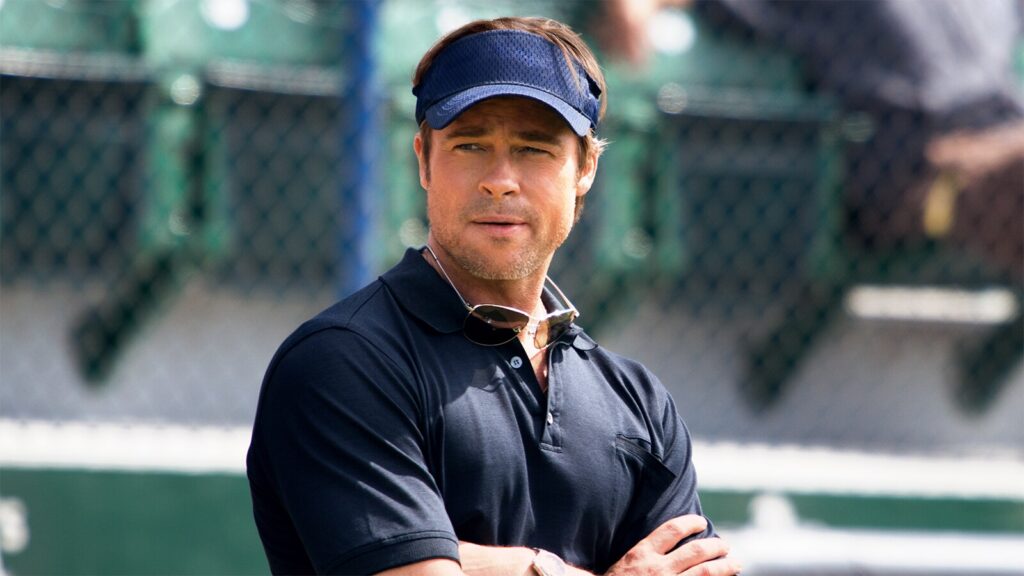How can you not be romantic about baseball? Well, when a movie like Moneyball cherry-picks history and ignores key facts, it’s pretty easy to lose the magic. NICE DIRECT LEDE
Having first-hand knowledge of growing up an Oakland A’s fan and living through the 2002 season attending games 17, 18 and 20 of the infamous streak, the film tells an incomplete and misleading story.
The 2011 acclaimed drama finally brought light to an overlooked baseball franchise. However, it prioritized a feel-good, underdog narrative at the expense of reality. Moneyball is entertaining, but it erases key contributors and distorts what actually made the 2002 Oakland A’s successful. STRONG VOICE; DEFINITIVE!
Before completely tearing this movie apart, it’s only fair to acknowledge that Moneyball isn’t bad; it’s just not for true baseball fans. Brad Pitt delivers a strong performance as Billy Beane and Aaron Sorkin’s signature writing shines in making complex baseball analytics accessible to a mainstream audience.
The inaccuracies in this movie can’t be overlooked. Starting with the core of the Oakland A’s success, the film portrays the A’s as a cast of misfits carried by analytics with the likes of Scott Hatteberg, David Justice, Chad Bradford and for some reason, multiple scenes spent on Ricardo Rincon.
In reality, this A’s team was built with homegrown stars brought in from traditional scouting, such as “The Big Three” Tim Hudson, Mark Mulder and Cy Young winner Barry Zito.
Of the 17 pitchers who took the mound for the A’s in 2002, the Big Three shouldered a massive workload. They accounted for 46% of the team’s total innings pitched (675), 48% of the strikeouts (493), and posted a combined ERA of just 3.05, proving they were the true backbone of the team’s success.
They are hardly referenced in the movie.
Another significant omission is the two offensive stars, Eric Chavez and Miguel Tejada. Chavez swatted 34 home runs and 109 RBIs while winning his second of six consecutive Gold Glove Awards.
Tejada only blasted 34 home runs and 131 RBIs on his way to earning the American League MVP. If that is not enough, his clutchness was on full display by the walk-off hits in games 18 and 19 of the streak.
His only scene in Moneyball is when he tells David Justice, “Welcome to Oakland, DJ,” when Justice finds out he has to pay for the soda in the clubhouse.
Riveting.
Every movie needs an antagonist, and Moneyball chose beloved manager Art Howe to resist Beane’s analytical vision, which was completely unfair. Howe was respected in the clubhouse by his players and has even spoken out about the inaccurate portrayal,
“It is very disappointing to know that you spent seven years in an organization and gave your heart and soul to it and helped them go to the postseason your last three years there and win over 100 games your last two seasons,” Howe said in an interview. “And this is the way evidently your boss feels about you.”
Perhaps the most infuriating information lapse in the film is how the A’s season ended in 2002. The film begins with the 2001 ALDS against the New York Yankees, where the audience is informed that the Yankees’ payroll is $152,749,814, and the A’s is $50,260,834.
The theme throughout the movie is that the A’s can’t compete with these big-budget organizations. Brad Pitt’s Beane makes that clear very early on.
“The problem we’re trying to solve is that there are rich teams, and there are poor teams. Then there’s 50 feet of crap. And then there’s us. It’s an unfair game.”
This an eye-catching, memorable quote from the movie, which ends with the A’s falling to the Minnesota Twins in five games of the ALDS, coming up short yet again.
The Twins must be one of those high-payroll teams that the A’s can’t compete with, right? The 2002 A’s had the 28th-ranked team payroll of $40,004,167. The Twins?
$40,225,000.
That’s right, the poor team that was buried under 50 feet of crap couldn’t get over the 27th-ranked payroll. But that doesn’t make for a good story.
Moneyball is an enjoyable escapism movie, but for baseball fans and those who have lived through the 2002 season, it is an insult to reality. The truth is the 2002 Oakland A’s were a great team because of a mix of elite homegrown talent, strong management and yes intelligent analytics, but Moneyball erases too much of the truth.


